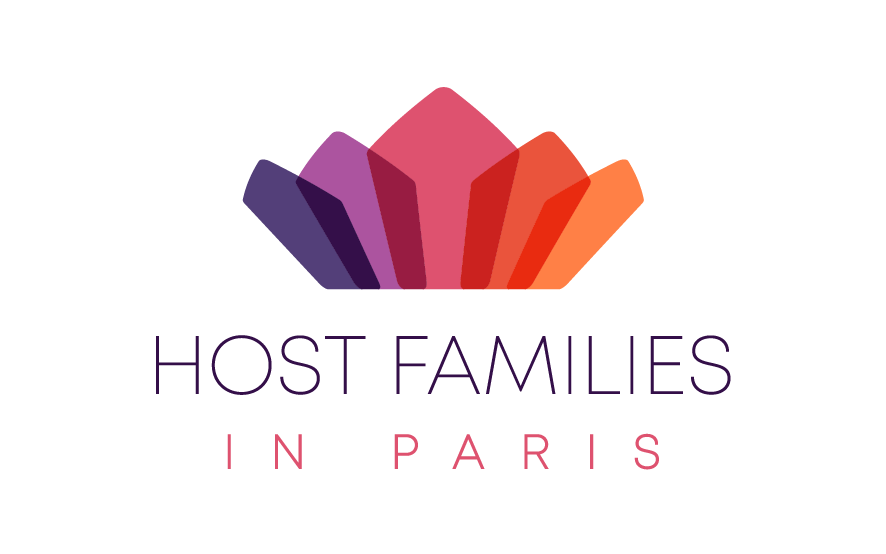Quality Charter
The quality charter sets out the conditions for hosting through Host Families in Paris (HFP). It is based on the principles of mutual tolerance and respect for others, and thus allows the host to enjoy a successful linguistic and cultural immersion and the host family to have an enriching exchange and relationship.
We recommend setting aside a time to review the cohabitation a few days or weeks after the arrival of the host with all members of the host family.
As a host, you agree to :
Contact your host family within 2 weeks of your arrival to initiate a first contact and to communicate :
- A brief description of yourself
- Your day and time of arrival at the airport (and flight number)
- The reasons for your visit to France and your stay with a host family
-
A mobile phone number to contact you.
Respect the customs, rhythms and habits of the family, make an effort to adapt to them and participate willingly in family and community life. You must also respect the privacy of your host family.
Be careful not to disturb the peace and quiet of the house with noise pollution (e.g. loud music in the bedroom late at night) or by occupying common areas unnecessarily.
Adhere to basic rules of politeness: make an effort to say "hello", "thank you", "goodbye" or offer to help clear the table, wash the dishes after dinner, etc.
Validate the cleanliness of the room on arrival, that there are no insects (such as bedbugs).
Leave the parts of the house you occupy in a satisfactory state of cleanliness and hygiene:
- Make your own bed, air the room for at least 10 minutes a day and keep it tidy so that cleaning can be done by the family.
- Make sure you leave the kitchen, bathroom and toilet clean after use. For each of these rooms, store your personal belongings in the place indicated by the family.
- In particular for the kitchen and bathroom, respect the rules and access times set by the family.
- Your personal belongings are washed at home, the normal practice is once a week. The use of the washing machine is to be determined with the host family. Sheets and towels are provided and washed by the family. This linen will be maintained and changed every 2 weeks for the sheets and once a week for the towels. Ask where you can hang your washing. You will have access to an iron and ironing board.
- It is not allowed to eat in the room or hang things on the walls.
Follow the indications concerning the meals included in the formula:
- French breakfast can consist of a hot drink (tea/coffee/milk), fruit/fruit juice, cereals or bread, butter and jam. If you need to eat anything else for this meal, you will have to buy it yourself. You will not be required to eat breakfast with the family, as work and/or study schedules are not always compatible with eating breakfast together. It is advisable for the family to agree with you on the breakfast schedule as soon as you arrive.
- Lunch is your responsibility.
- Access to the kitchen will be discreet. You and your host family must agree on the use of the kitchen and the time of day.
- Please give sufficient notice if you cannot come to dinner or if you are late so that the family can make the necessary arrangements. The number of dinners per week is from 1 to 7 depending on the chosen ½ board formula.
Apart from the communal meals, you must buy your own food and can store it in a reserved area. Do not use the family's products unless they have given you permission to do so. - Allergies and dietary habits: it is your responsibility to clearly explain to the family any allergies, dietary restrictions and/or medical considerations upon arrival. These may be subject to a supplement in the ½ board formula.
Respect the rules of access to the bathroom and agree on times. In most homes, the bathroom is shared with other family members, so it is important not to occupy this space for too long. Long, multiple showers during the day are not a local custom.
Make sure you have the right plugs for your electrical appliances.
Always ask permission to invite and receive guests. If the family members agree, the times, frequency and type of guest must be approved by the host family every time, even in their absence.
Respect the fact that the family can "reserve" certain rooms in the house for their exclusive use.
Respect the fact that the family may have guests of their own, without your presence being desired.
All telephone communication should be made within reasonable time frames. Avoid all types of calls (phone, skype, zoom etc) between 11pm and 6am (except in emergencies).
Ask permission to use the family printer. Be sensitive about replacing cartridges and replenishing paper from time to time.
The HADOPI law punishes illegal downloads and you can be prosecuted for this.
Do not smoke in the house unless otherwise agreed.
Provide a certificate of insurance "civil liability - comprehensive home insurance" mandatory. You are responsible for any damage to your host family's property that you may cause.
Turn off the lights when you leave a room last and turn down the heating when you leave your room. Ask your family how this works at home. Turn down the heat at night; if you are cold, ask for an extra blanket instead.
Take responsibility for lost keys.
- Loss of keys may result in the replacement of the lock. You will be held financially responsible for the replacement of the keys and locks (please note that this can cost up to 1200€).
- The set of keys received on arrival must be returned on departure.
Have no financial relationship, for whatever reason, with the family.
Do not pass on any information about the family to third parties (e.g. for the purpose of future accommodation). Also, ask permission before posting any information and/or photos about the accommodation and/or members of the household on social networks.
Renewing or extending your stay must be done by mutual agreement with Host Families in Paris.
If you need help,
Do not hesitate to ask the host family for advice. It is always easier to communicate directly to solve a problem, especially a material one (noise, a malfunctioning tap, an uncomfortable mattress, the content of meals, etc.). It is normal to encounter differences from your country (different living environment, smaller flat, etc.), this is part of the experience. We hope that everyone participates in this experience with an open and flexible mind. If necessary, HFP can intervene at the request of either party.
The more you invest in the relationship with your host family, the better your experience will be! Don't wait for someone to come and get you in your room, take the lead by showing that you are interested in the people you are staying with, without necessarily feeling obliged to spend all your time together.

As a host family,
you agree to :
Facilitate access for the guest to a culture, a way of life and a country that he or she may not yet know. You will organise to welcome them on their arrival and give them a friendly, family welcome. Be available at the beginning of your stay. The first few days are very important for her to get used to you and your home. In order to help your guest adapt, we advise you to be present the first two weekends of her stay with you.
Provide a brief orientation of the area, including directions to the nearest metro/bus. Invite the host to come and do some shopping or help with the meals (so that he/she can get to know the area and your own habits).
Respect the beliefs, dietary habits and rituals of your guest. You will take into account any allergies, dietary restrictions and/or medical considerations. These may be subject to a supplement in the ½ board formula.
Respect the privacy, sleep and tranquillity of the guest in accordance with the normal rhythm of a working day.
Please bear in mind that there are two types of accommodation: single and double rooms. A single room is a room for the exclusive use of the guest. A double room is a room with two beds, shared by two people (usually from the same group).
At the beginning of the stay, discuss with the guest how much participation in family life you wish to allow. Apart from his or her own room, he or she has access to the kitchen, bathroom and toilet facilities of the flat. You should agree on the times when these shared areas can be used. Access to other parts of the accommodation is subject to your permission. You can therefore "reserve" certain rooms in the house for yourself.
Make sure that the guest room is very clean (spotless) on arrival and that there are no insects (e.g. bed bugs).
Ensure the regular maintenance and cleaning of the accommodation, including the guest's room and even bathroom. You may receive instructions to the contrary from Host Families in Paris, for example for health reasons.
On arrival, tell the guest the rules and times for using the kitchen, bathroom and toilet facilities. You will also specify the times at which the meals provided for in the formula will take place (breakfast and dinner) as well as the day of the week devoted to cleaning and laundry.
Provide the guest with free Wi-Fi access so that they can use the Internet freely.
Providing the rules related to the kitchen: apart from the time of communal meals, access to the kitchen is allowed to the host, as long as it respects the normal rhythm of the family (respecting the times announced at the beginning and not eating too late for example). The host must tidy the kitchen and leave it clean after each use. You will provide a place in the fridge and a cupboard where she can keep her personal food separate from yours.
Indicate the rules of access to the bathroom to the guest, allowing him/her a daily shower. There will be access that respects the rhythm of use of each person, bearing in mind that long and multiple showers during the day are not part of local customs.
Explain to the guest how to organise the washing of their personal clothes:
- if you do it for him, if he does it himself ;
- where to put your dirty laundry;
- laundry day;
- where to hang out clothes how to use the iron.
Keep in mind that some guests may not feel comfortable giving their personal laundry to someone else. Do not hesitate to discuss this together.
Offer the guest a room (heated to at least 19°C) with a bed and mattress in good condition, as well as a desk or work table with a chair, good lighting and storage space for personal belongings. Explain to the guest how the heating in the room works and what you expect them to do to manage it.
Provide sufficient household linen: sheets, towels and tablecloths. This linen will be maintained by you and changed every two weeks for the sheets and once a week for the towels.
Take the time to share meals with the host, according to the formula chosen by the latter. Meals play an essential role in the integration of the host, in the French culture but also within the family group. The formula includes a daily breakfast and up to 7 dinners (depending on the formula chosen) per week. You will ensure that these meals are balanced and varied.
- French breakfast is provided daily. It may consist of a hot drink (tea/coffee/milk), fruit/fruit juice, cereals or bread, butter and jam. You will not be required to eat breakfast with the guest, nor will you be required to provide additional items.
- As soon as the host arrives, draw up a schedule of the days we will eat together and the times when we will arrive. If it is not possible to have a meal with the family, the host will inform you as soon as possible so that you can make arrangements (e.g. leave the meal with them).
- Dinner is considered to be the main meal and a special time for sharing, in the presence of the host family. The dinner will depend on the family's habits and will generally include a starter, a main course (a source of protein accompanied by one or more side dishes), cheese and/or dessert.
Unless you authorise them to do so (and except in an emergency), the host must avoid all types of calls (telephone, Skype, Zoom etc.) between 11pm and 6am. He/she may have access to the means of communication available in the accommodation (television, printer, etc.) after having received permission and having defined the terms of use with you.
In principle, the guest is not allowed to smoke in the house. However, each family is free to deviate from this rule, and to define the modalities (frequency, time slots, and reserved areas). Smokers should be careful not to disturb other members of the household by excessive smoking.
Give a full set of keys to the guest on arrival. Tell them where to put the keys when they are at home. It is useful to explain how to use the lock and what to do if the set is lost.
The host is not allowed to receive guests. You may give permission for occasional visits and are asked to clearly define the frequency, the nature and the rooms not allowed (bedrooms or other).
As an adult, please allow your host to dine and sleep outside whenever he/she wishes. They will notify you as soon as possible so that you can make arrangements.
Notify the host of your absence, whether for a meal, an evening, a day, an overnight stay or several nights.
If you are going to be away for one or more nights, make sure you leave contact details where you can be reached in an emergency. If you cannot be reached easily, you should indicate a trusted person (caretaker, neighbour, family member, friend) to contact in case of emergency. Host Families in Paris should be notified if you are going to be away for more than 2 days.
With regard to your property, the guest is responsible for any damage caused. Similarly, you are responsible for any damage to the host's personal property.
Return any (unopened) mail received for a guest after their departure to the sender in NPAI (No longer living at the specified address).
Explain to the guest your energy consumption and conservation habits (water, heating, electricity, etc.) as well as the use of heating in their room. Explain how the selective sorting works in your building and what is important for you in terms of energy saving: turning off the light at night, using your bedside lamp when you work late, turning off the light when you leave a room, not overheating, unplugging the socket when there is no more appliance, duration of a shower, etc.
Comply with current health and safety standards, including the fitting of a valid smoke detector (compulsory in France as of 8 March 2015). It is advisable to have a fire extinguisher and, in the case of gas and/or boilers, a carbon monoxide detector.
Instruct the guest on what to do in case of an electrical, plumbing or other emergency. It is also important to show them how to turn off the water and gas, how to use the electricity switch, and to provide emergency telephone numbers and contact information.
Have no financial relationship, for whatever reason, with the host.
Renewal or extension of stay must be done in conjunction with Host Families in Paris.
If you have something to say to your host, do it orally, not in writing. Oral communication is generally better perceived and your host will feel treated like an adult.
A somewhat formal discussion could take place two or three weeks after the arrival of the host to review the progress of the cohabitation. The aim is to create a moment where everyone can express themselves by asking questions about points that are not well understood. The aim is to listen to each other and to establish an open and balanced dialogue. We thank you for being sensitive to the richness and diversity of your guests, who all come from different backgrounds.


